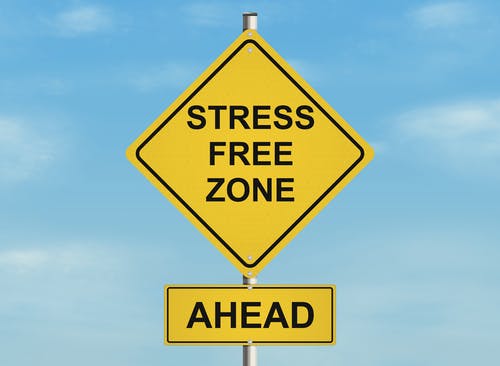What is stress?
Stress is the body’s response to pressure, whether internally or externally caused, and may present with physical or mental symptoms that are disruptive to everyday function.[1] While not all of the effects of stress are bad – after all, stress is a reasonable ‘fight or flight’ response under certain circumstances – they can be overwhelming and even unhealthy when left unchecked.
Stress becomes a health problem when it persists for long periods, leading to greatly lowered or affected productivity in our daily lives. As well, poorly managed stress can lead to unhealthy coping mechanisms, perpetuating a negative cycle that hurts our well-being.
Because stress leads to the release of cortisol, which lowers insulin levels and increases blood glucose,[2] and adrenaline, which increases heart rate and elevates blood pressure,[3] prolonged or chronic stress can lead to poor health conditions, especially among adults with compromised immune systems.
What are the symptoms of stress?
Some symptoms of stress include difficulty sleeping, weight problems, restlessness, forgetfulness, anger, moodiness, and irritability.[4]
To wit, some folks experience only a few such symptoms. It is also not unheard of for adults to experience only a few signs of stress, or not notice the severity of their symptoms – both of which can be unhealthy and may lead to chronic stress, or even a nervous breakdown.[5]
Speak with your Mosh doctor about how to deal with stress. Your doctor will be better equipped to advise you on how to reduce stress levels, through counselling, therapy, or prescription medication.
What are the five stress management techniques?
When it comes to how to deal with stress symptoms, there are five generally accepted ways to manage them or even help mitigate some of their root causes.
Exercise and nutrition- [6] Physical exercise can help you deal with stress, both as a way to relieve stress and as a way to improve your overall health. Similarly, a healthy diet contributes to helping you combat stress more effectively.
Meditation- Meditation has long been practised as a way to reduce stress.[7] Cultures all over the world have holistic meditation practices that are purported to help alleviate not just stress but other disruptive types of thinking.
Breathing Exercises- Breathing exercises help calm the ‘fight or flight’ responses our body activates in response to stress triggers. By continuously breathing through the diaphragm, you can activate your parasympathetic nervous system to calm the stress responses, which reduces stress and anxiety.[8] These exercises are also useful for managing certain types of anxiety.
Social media management- Due to the growing popularity of social media platforms, curated online spaces have become essential in how to deal with stress by making our online spaces safer and less stressful. Taking a breather from social media activity can also help boost mental health.[9]
Interpersonal Relationships- Humans are social creatures - we feel cared for and supported by others when we connect with them. Shared activities can help with how to deal with stress by providing support and fostering relationships that can help in reducing the effects of stress.[10]
In some situations, our stress response to extremely upsetting situations can lead to Post-Traumatic Stress Disorder (PTSD) or other stress-related mental health disorders.[11] Thus, it’s crucial that we practise safe and healthy coping strategies regarding stress management.
If you feel that you’re suffering from chronic stress, speak with your Mosh doctor about how to approach your treatment.
What are some examples of breathing exercises that help with stress?
Whether it’s stress or social anxiety that has you on high alert at all times, breathing exercises can help with how to deal with stress to calm our ‘fight or flight’ responses, even temporarily.[12]
An example of this is beep breathing. This exercise involves both deep breaths and tactile input by touching your belly or chest, thus helping you centre your thoughts on the process of breathing.
Find a comfortable position where your back, shoulders, and neck are supported; sitting down or reclining against a soft surface is preferable. With one hand on your chest and the other on your belly, take a deep breath through your nose, filling your belly with air.
Exhale through your nose at an even pace; the hand on your belly should rise and fall with your breathing while the hand on your chest stays steady. Repeat this process three to five more times or until the slow breathing feels natural instead of practised.
While breathing techniques like these have an observed positive effect in treating the symptoms of stress, further counselling or medication may still be needed.
Speak with your Mosh doctor regarding how to deal with stress. Through a brief questionnaire, which may include a depression test, your doctor will assess if prescription medication is a more appropriate treatment for your symptoms.
What type of foods are good for stress relief?
Our diet is a big part of our health, and so it follows that a healthy diet can contribute to how to deal with stress better. The following food items are known to help soothe or calm stressed nerves.
Fresh herbal tea- A warm drink can provide a sense of calmness and warmth, similar to warm milk, because of the soothing associations with the temperature. In addition, herbal teas like chamomile typically contain flavonoids, which are known to have nutritional properties on their own.[13]
Citrus fruits- A diet rich in foods high in vitamin C, such as oranges, grapefruits, and strawberries, can reduce anxiety levels when consumed in healthy quantities.[14] Citrus fruits are also rich in nutrients that boost the immune system.
Fibre-rich foods- Eating foods high in fibre can help boost your mood and is thought to be linked to the reduction of symptoms of stress, anxiety, and depression.[15]
Healthy bodies lead to healthy minds, and vice versa. Whether through counselling, holistic therapy, or prescription medication, your Mosh health practitioner will help you find your footing again. All of our health practitioners are fully licensed and registered with the Australian Health Practitioner Regulation Agency (AHPRA), so you can trust that your well-being is in good hands.
Speak with a Mosh mental health practitioner on how to deal with stress today.

